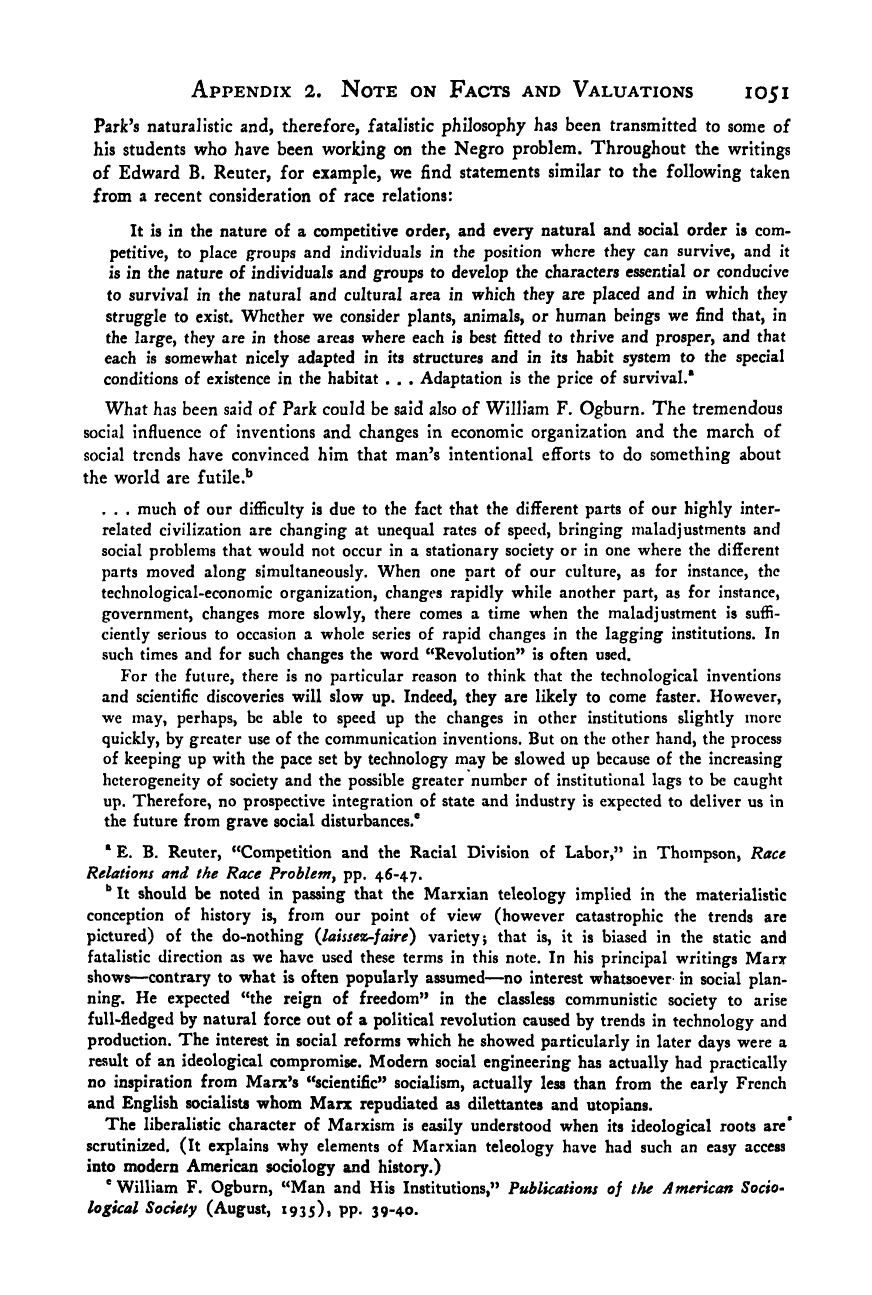Note: Gunnar Myrdal died in 1987, less than 70 years ago. Therefore, this work is protected by copyright, restricting your legal rights to reproduce it. However, you are welcome to view it on screen, as you do now. Read more about copyright.
Full resolution (TIFF) - On this page / på denna sida - Appendices - 2. A Methodological Note on Facts and Valuations in Social Science - 3. The History and Logic of the Hidden Valuations in Social Science

<< prev. page << föreg. sida << >> nästa sida >> next page >>
Below is the raw OCR text
from the above scanned image.
Do you see an error? Proofread the page now!
Här nedan syns maskintolkade texten från faksimilbilden ovan.
Ser du något fel? Korrekturläs sidan nu!
This page has never been proofread. / Denna sida har aldrig korrekturlästs.
Appendix 2. Note on Facts and Valuations 1051
Park’s naturalistic and, therefore, fatalistic philosophy has been transmitted to some of
his students who have been working on the Negro problem. Throughout the writings
of Edward B. Reuter, for example, we find statements similar to the following taken
from a recent consideration of race relations:
It is in the nature of a competitive order, and every natural and social order is com-
petitive, to place groups and individuals in the position where they can survive, and it
is in the nature of individuals and groups to develop the characters essential or conducive
to survival in the natural and cultural area in which they are placed and in which they
struggle to exist. Whether we consider plants, animals, or human beings we find that, in
the large, they are in those areas where each is best fitted to thrive and prosper, and that
each is somewhat nicely adapted in its structures and in its habit system to the special
conditions of existence in the habitat . . . Adaptation is the price of survival.*
What has been said of Park could be said also of William F. Ogburn. The tremendous
social influence of inventions and changes in economic organization and the march of
social trends have convinced him that man’s intentional eflforts to do something about
the world are futile.’’
. . . much of our difficulty is due to the fact that the different parts of our highly inter-
related civilization are changing at unequal rates of speed, bringing maladjustments and
social problems that would not occur in a stationary society or in one where the different
parts moved along simultaneously. When one part of our culture, as for instance, the
technological-economic organization, changes rapidly while another part, as for instance,
government, changes more slowly, there comes a time when the maladjustment is suffi-
ciently serious to occasion a whole series of rapid changes in the lagging institutions. In
such times and for such changes the word “Revolution” is often used.
For the future, there is no particular reason to think that the technological inventions
and scientific discoveries will slow up. Indeed, they are likely to come faster. However,
we may, perhaps, be able to speed up the changes in other institutions slightly more
quickly, by greater use of the communication inventions. But on the other hand, the process
of keeping up with the pace set by technology may be slowed up because of the increasing
heterogeneity of society and the possible greater number of institutional lags to be caught
up. Therefore, no prospective integration of state and industry is expected to deliver us in
the future from grave social disturbances.®
* E. B. Reuter, “Competition and the Racial Division of Labor,” in Thompson, Rac^
Relations and the Race Problenty pp. 46-47.
^
It should be noted in passing that the Marxian teleology implied in the materialistic
conception of history is, from our point of view (however catastrophic the trends are
pictured) of the do-nothing {laissez-faire) variety} that is, it is biased in the static and
fatalistic direction as we have used these terms in this note. In his principal writings Marx
shows—contrary to what is often popularly assumed—no interest whatsoever in social plan-
ning. He expected “the reign of freedom” in the classless communistic society to arise
full-fledged by natural force out of a political revolution caused by trends in technology and
production. The interest in social reforms which he showed particularly in later days were a
result of an ideological compromise. Modem social engineering has actually had practically
no inspiration from Marx’s “scientific” socialism, actually less than from the early French
and English socialists whom Marx repudiated as dilettantes and Utopians.
The liberalistic character of Marxism is easily understood when its ideological roots are*
scrutinized. (It explains why elements of Marxian teleology have had such an easy access
into modern American sociology and history.)
®
William F. Ogburn, “Man and His Institutions,” Publications of the American Socio~
logical Society (August, 1935), PP* 39-40.
<< prev. page << föreg. sida << >> nästa sida >> next page >>